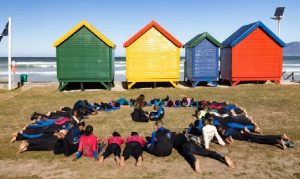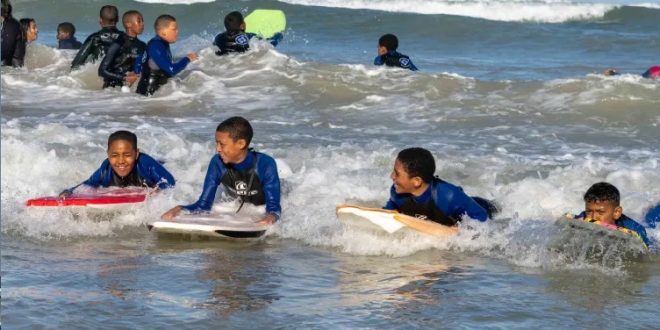04-12-2023
CAPE TOWN: It’s a Monday morning and a dozen teenagers from a school for students with autism and related conditions have arrived for their weekly surf therapy session.
Shrieking with glee, one girl envelops her coach in a bear hug. Others are less demonstrative, but the joy on their faces is palpable.
 After trading their school uniforms for wetsuits, the students gather on Cape Town’s Muizenberg Beach. A gentle offshore breeze is blowing, and neat rows of waves stack up invitingly towards Cape Point but before the budding surfers get near the water, they must do a land-based mental health session.
After trading their school uniforms for wetsuits, the students gather on Cape Town’s Muizenberg Beach. A gentle offshore breeze is blowing, and neat rows of waves stack up invitingly towards Cape Point but before the budding surfers get near the water, they must do a land-based mental health session.
The day’s lesson, Coach Bulelani Zelanga informs media, is called Thankful Take 5.
First, the coaches list three things they’re thankful for.
“I am thankful that I found Waves for Change,” Zelanga says. “I am thankful for my support network and I am thankful that I am still breathing.”
Next the children are taken through a series of breathing exercises and encouraged to think of things they’re thankful for. There’s no pressure to share these with the group, but a few brave souls put up their hands.
“I am thankful for my coaches,” one says. “I am thankful for my parents,” says another.
After about 20 minutes on the beach, it’s time to get into the ocean. Most of the participants are content with splashing around in the waves, many of them can’t swim but a few try their hand at bodyboarding.
 While they play, the coaches are on hand to reassure them and to encourage them to use their newly acquired breathing skills to cope with the unfamiliar environment.
While they play, the coaches are on hand to reassure them and to encourage them to use their newly acquired breathing skills to cope with the unfamiliar environment.
Zelanga says there’s more actual surfing when the neurotypical kids come in the afternoons, but he also says this isn’t the point: “Therapy comes first, surfing is second” and with good reason: Children in South Africa’s townships can frequently experience traumatic events, and there’s a dearth of social workers and psychologists in their communities.
“We aren’t trying to find the next Kelly Slater,” Tim Conibear, the 42-year-old founder and CEO of Waves for Change, tells media, referring to the great United States surfer.
“It’s all about giving kids from difficult backgrounds coping mechanisms and self-regulation strategies. Surfing is just the hook.”
Waves for Change works with children aged 11 to 13 who are at high-risk of “toxic stress”, such as those affected by poverty, disabilities, gang violence, or a lack of access to mental health and social services, they are referred by a teacher, nurse or social worker. (Int’l News Desk)
 Pressmediaofindia
Pressmediaofindia




